Funeral Liturgies
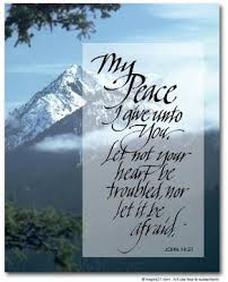
Please know of our heartfelt condolences on the loss of a loved one. Our entire Parish Family joins with you and your family in prayer that God will give you peace in the midst of your grief. Here at St. John of God, we wish to show our support for you during this very difficult time, and to assist you in making arrangements for your departed loved one.
The Church, through its Funeral Rites, commends those who have died to God's merciful love and affirms and expresses the union of the Church on earth with the Church in heaven. Though separated from the living, the dead are still one with the community of believers here on earth and benefit from our prayers and intercession. In the Funeral Rites, we proclaim our belief that all the faithful will be raised up and reunited in the new heavens and a new earth, where death will be no more.
The funeral director will provide assistance in planning the Liturgy, but we would also like to suggest that you meet with the parish priest as well especially since in most cases he will be celebrating the liturgy. This can be especially helpful in planning the homily. Please call our Parish Secretary to make an appointment with him.
The purpose of this page is to assist you in planning a Funeral Mass according to the Rite of the Roman Catholic Church. We invite you to participate in the planning of the Funeral Mass. While there is a specific structure to the Funeral Mass, there are opportunities within that structure to make specific choices including the Scripture Readings and hymns as well as those who will actively participate in the Mass. These various options are explained here.
Please take a few moments to read through this page. There is a form that you can print on line with your selections to make planning the liturgy easier. You can give your selection to the priest in the rectory if you are meeting with him, at the wake, or you can give them to our Parish Secretary to give to him.
Click here for the Funeral Planner Form.
The Church, through its Funeral Rites, commends those who have died to God's merciful love and affirms and expresses the union of the Church on earth with the Church in heaven. Though separated from the living, the dead are still one with the community of believers here on earth and benefit from our prayers and intercession. In the Funeral Rites, we proclaim our belief that all the faithful will be raised up and reunited in the new heavens and a new earth, where death will be no more.
The funeral director will provide assistance in planning the Liturgy, but we would also like to suggest that you meet with the parish priest as well especially since in most cases he will be celebrating the liturgy. This can be especially helpful in planning the homily. Please call our Parish Secretary to make an appointment with him.
The purpose of this page is to assist you in planning a Funeral Mass according to the Rite of the Roman Catholic Church. We invite you to participate in the planning of the Funeral Mass. While there is a specific structure to the Funeral Mass, there are opportunities within that structure to make specific choices including the Scripture Readings and hymns as well as those who will actively participate in the Mass. These various options are explained here.
Please take a few moments to read through this page. There is a form that you can print on line with your selections to make planning the liturgy easier. You can give your selection to the priest in the rectory if you are meeting with him, at the wake, or you can give them to our Parish Secretary to give to him.
Click here for the Funeral Planner Form.
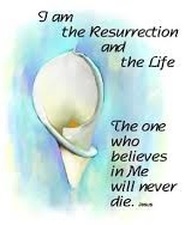
The Introductory Rites
When the family and friends, accompanying the body of the deceased, have arrived at the church, the priest and other ministers greet them at the door of the church. As a reminder of the deceased person's entrance into the faith through Baptism, the casket containing the remains of the deceased is sprinkled with holy water and a white pall is placed over it. It is encouraged that members of the family assist in the placing of the pall.
A member of the family may place a symbol of Christian life, e.g., a cross, a bible, the Book of Gospels, on top of the pall at this time.
The funeral procession then proceeds into the church as a hymn is sung. Family and friends are invited to take their seats in the front of the church and remain standing for the opening prayer of the Mass.
When the family and friends, accompanying the body of the deceased, have arrived at the church, the priest and other ministers greet them at the door of the church. As a reminder of the deceased person's entrance into the faith through Baptism, the casket containing the remains of the deceased is sprinkled with holy water and a white pall is placed over it. It is encouraged that members of the family assist in the placing of the pall.
A member of the family may place a symbol of Christian life, e.g., a cross, a bible, the Book of Gospels, on top of the pall at this time.
The funeral procession then proceeds into the church as a hymn is sung. Family and friends are invited to take their seats in the front of the church and remain standing for the opening prayer of the Mass.
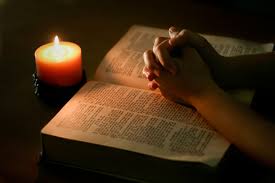
The Liturgy of the Word
The community now gathers to listen to God's Word as proclaimed in Holy Scripture. Generally, three readings are proclaimed: the first from the Old Testament (Hebrew Scriptures), the second from the New Testament (Letters) and, finally, the Gospel.
We encourage you to choose the first and second readings. The gospel is usually chosen by the celebrant because his homily is based upon it, but the family is welcome to make some suggestions.
As a rule the readings including the gospel are chosen from the Rite for Funerals. If there is another reading from Scripture that you would like to suggest, please discuss this with the priest.
It is appropriate to have members of the family or friends read the selected Scripture passages at Mass. It is preferable to have a different reader for each of the first two readings. If there is no one able or willing to read at Mass, a lector will be available from the parish community.
The response to the first reading is a psalm which is usually sung. The response is never a song unless that song is a psalm. If you want a particular psalm sung please convey this to the Funeral Director who will convey it to the Parish, or speak with the priest directly.
The homily follows the Scripture readings and is given by the priest or deacon. The purpose of the homily is to focus on God's compassionate love and on the Easter mystery of death leading to resurrection and how we are called to live in the light of this mystery of our faith. If you have any particular suggestions to offer in this regard in light of the life of faith of the deceased, please speak with the celebrant.
After the homily, the General Intercessions (Prayer of the Faithful) are offered. Family members are welcome to read these as well. Possible choices are found below. You may adapt these to reflect the particular circumstances of the deceased. Please consult with the priest in this regard.
The most common selection for readings are found on line. Click on the following links
First Reading
Second Reading
Gospel
Petitions
The community now gathers to listen to God's Word as proclaimed in Holy Scripture. Generally, three readings are proclaimed: the first from the Old Testament (Hebrew Scriptures), the second from the New Testament (Letters) and, finally, the Gospel.
We encourage you to choose the first and second readings. The gospel is usually chosen by the celebrant because his homily is based upon it, but the family is welcome to make some suggestions.
As a rule the readings including the gospel are chosen from the Rite for Funerals. If there is another reading from Scripture that you would like to suggest, please discuss this with the priest.
It is appropriate to have members of the family or friends read the selected Scripture passages at Mass. It is preferable to have a different reader for each of the first two readings. If there is no one able or willing to read at Mass, a lector will be available from the parish community.
The response to the first reading is a psalm which is usually sung. The response is never a song unless that song is a psalm. If you want a particular psalm sung please convey this to the Funeral Director who will convey it to the Parish, or speak with the priest directly.
The homily follows the Scripture readings and is given by the priest or deacon. The purpose of the homily is to focus on God's compassionate love and on the Easter mystery of death leading to resurrection and how we are called to live in the light of this mystery of our faith. If you have any particular suggestions to offer in this regard in light of the life of faith of the deceased, please speak with the celebrant.
After the homily, the General Intercessions (Prayer of the Faithful) are offered. Family members are welcome to read these as well. Possible choices are found below. You may adapt these to reflect the particular circumstances of the deceased. Please consult with the priest in this regard.
The most common selection for readings are found on line. Click on the following links
First Reading
Second Reading
Gospel
Petitions
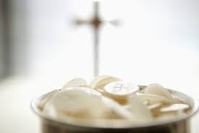
The Liturgy of the Eucharist
Family members are invited to bring the gifts of bread and wine to be received by the priest. These are located on a small table near the front doors of the Church. The Funeral Director will assist the family members at the appropriate time. Please indicate on the Selection Card who will bring up the gifts, and how many bearers there will be. It is ideal to have two gift bearers, but up to four are possible.
The usual order of Mass follows. After the Eucharistic Prayer, we recite the Lord's Prayer, exchange a sign of peace and prepare to receive Holy Communion. Those of the Catholic faith, who are spiritually prepared to receive our Lord in the Sacrament of the Eucharist, are invited to come forward down the center aisle and return by the side aisle. Those who are not receiving are asked to remain at their seats during this time and offer a "Spiritual Communion" for the intention of the deceased.
Family members are invited to bring the gifts of bread and wine to be received by the priest. These are located on a small table near the front doors of the Church. The Funeral Director will assist the family members at the appropriate time. Please indicate on the Selection Card who will bring up the gifts, and how many bearers there will be. It is ideal to have two gift bearers, but up to four are possible.
The usual order of Mass follows. After the Eucharistic Prayer, we recite the Lord's Prayer, exchange a sign of peace and prepare to receive Holy Communion. Those of the Catholic faith, who are spiritually prepared to receive our Lord in the Sacrament of the Eucharist, are invited to come forward down the center aisle and return by the side aisle. Those who are not receiving are asked to remain at their seats during this time and offer a "Spiritual Communion" for the intention of the deceased.
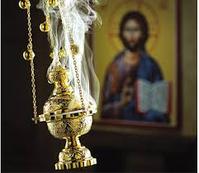
Final Commendation & Procession to the Place of Committal
After a brief invitation to pray in silence, the remains of the deceased are reverently incensed and the Prayer of Commendation is offered.
The priest and assisting ministers precede the casket/remains; the family and friends follow. The pall is removed from the casket by the Funeral Director at the door. If a Christian symbol was placed on the casket, it would be removed at this time, and given to the family. An appropriate hymn is sung.
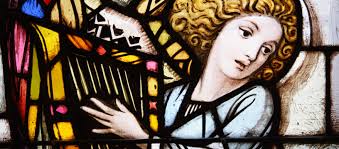
Music In the Funeral Mass
Our Choir Director and principal organist, Mr Tobie Montie, is not available to play funerals during the week. He is occasionally available on a Saturday. We use a variety of musicians for funerals depending upon who is available. We usually have an organist who also sings.
Like a regular Sunday Mass, the music chosen at a Funeral Mass is meant to encourage the congregation to participate. If there are any particular hymns that you would like sung at the Funeral Mass, you should mention them to the Funeral Director at the time of making arrangements who will will convey them to the Parish.
Only hymns and songs of a Sacred nature will be allowed for the Funeral Mass. Secular songs are not allowed in the funeral liturgy (or any liturgy). Secular songs loved by the deceased can be played at the Funeral home or at the cemetery.
If you have selected a sacred song that is not in our hymnal, it is the responsibility of the family to get the sheet music to the musicians in time for them to learn it. It is not the responsibility of the parish or the musicians to secure the sheet music for the Mass if you are selecting a song not in our hymnal, Breaking Bread.
Sometimes the request is made for a family member or friend to sing at the funeral. This request should be conveyed to the Funeral Director at the time of making the arrangements who will convey it to the Parish. The family should also consult directly with the priest to finalize these arrangements. Usually, the outside singer must arrive at the church at least 30 minutes before the Mass to practice with the organist.
Our Choir Director and principal organist, Mr Tobie Montie, is not available to play funerals during the week. He is occasionally available on a Saturday. We use a variety of musicians for funerals depending upon who is available. We usually have an organist who also sings.
Like a regular Sunday Mass, the music chosen at a Funeral Mass is meant to encourage the congregation to participate. If there are any particular hymns that you would like sung at the Funeral Mass, you should mention them to the Funeral Director at the time of making arrangements who will will convey them to the Parish.
Only hymns and songs of a Sacred nature will be allowed for the Funeral Mass. Secular songs are not allowed in the funeral liturgy (or any liturgy). Secular songs loved by the deceased can be played at the Funeral home or at the cemetery.
If you have selected a sacred song that is not in our hymnal, it is the responsibility of the family to get the sheet music to the musicians in time for them to learn it. It is not the responsibility of the parish or the musicians to secure the sheet music for the Mass if you are selecting a song not in our hymnal, Breaking Bread.
Sometimes the request is made for a family member or friend to sing at the funeral. This request should be conveyed to the Funeral Director at the time of making the arrangements who will convey it to the Parish. The family should also consult directly with the priest to finalize these arrangements. Usually, the outside singer must arrive at the church at least 30 minutes before the Mass to practice with the organist.
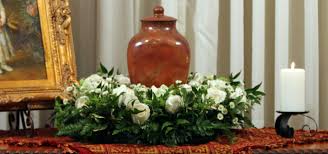
Cremation
"Although cremation is now permitted by the Church, it does not enjoy the same value as burial of the body.The Church clearly prefers and urges that the body of the deceased be present for the funeral rites, since the presence of the human body better expresses the values which the Church affirms in those rites" (Section 413 of the Order of Christian Funerals' Appendix on Cremation)
While the Church continues to hold a preference for corporeal burial, cremation has become part of Catholic practice in the United States and the around the world.
The Church's reverence and care for the body grows out of a reverence and concern for the person whom the Church now commends to the care of God. This is the body once washed in baptism, anointed with the oil of salvation, and fed with the bread of life. This is the body whose hands clothed the poor and embraced the sorrowing. The human body is so inextricably associated with the human person that it is hard to think of a human person apart from his or her body.
It is preferred that the wake and Funeral Mass precede cremation of the body. However, when cremation has preceded the Mass, the remains of the deceased may be carried in and placed on a small table which will be in the front of the altar. It is assumed, in keeping with the teachings of the Catholic Church, that cremated remains of a loved one are to be buried in keeping with the dignity and reverence of the body.
If neither the body nor the cremated remains will be present at the Mass, a Memorial Mass, not a Funeral Mass, will be celebrated. Please speak with the priest if there are any questions.
"Although cremation is now permitted by the Church, it does not enjoy the same value as burial of the body.The Church clearly prefers and urges that the body of the deceased be present for the funeral rites, since the presence of the human body better expresses the values which the Church affirms in those rites" (Section 413 of the Order of Christian Funerals' Appendix on Cremation)
While the Church continues to hold a preference for corporeal burial, cremation has become part of Catholic practice in the United States and the around the world.
The Church's reverence and care for the body grows out of a reverence and concern for the person whom the Church now commends to the care of God. This is the body once washed in baptism, anointed with the oil of salvation, and fed with the bread of life. This is the body whose hands clothed the poor and embraced the sorrowing. The human body is so inextricably associated with the human person that it is hard to think of a human person apart from his or her body.
It is preferred that the wake and Funeral Mass precede cremation of the body. However, when cremation has preceded the Mass, the remains of the deceased may be carried in and placed on a small table which will be in the front of the altar. It is assumed, in keeping with the teachings of the Catholic Church, that cremated remains of a loved one are to be buried in keeping with the dignity and reverence of the body.
If neither the body nor the cremated remains will be present at the Mass, a Memorial Mass, not a Funeral Mass, will be celebrated. Please speak with the priest if there are any questions.
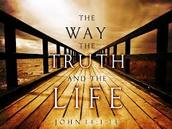
A final word
As Catholics, we celebrate the Funeral Rites to offer worship, praise and thanksgiving to God for the gift of a life which has now returned to God, the author of life and the hope of the just. It is our prayer that our assistance and presence as a Church to your family may lighten the burden of your loss and assure you, with the confidence that only faith can give, that your loved one will one day share in the promise of life eternal for all who place their lives in His hands.
As Catholics, we celebrate the Funeral Rites to offer worship, praise and thanksgiving to God for the gift of a life which has now returned to God, the author of life and the hope of the just. It is our prayer that our assistance and presence as a Church to your family may lighten the burden of your loss and assure you, with the confidence that only faith can give, that your loved one will one day share in the promise of life eternal for all who place their lives in His hands.